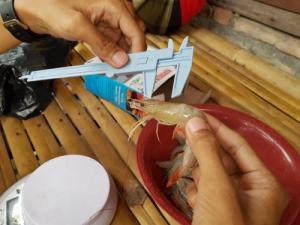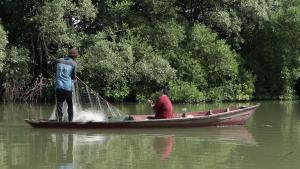On the Indonesian island of Java – the second largest in the archipelago and the world’s most populous – a small, unassuming fishery combs the nearshore waters in search of shrimp. The fishers are from local villages built along the shoreline, close to the resources that they and their families rely upon. Using trammel nets and traps, some even positioned right outside of homes on stilts, the fishers target white shrimp, destined for a nearby shrimp cracker facility that primarily exports to the EU. It’s a small venture, but one that is making its way toward the national stage.
This fishery, the Indonesia Central Java White Prawn Fishery Improvement Project (FIP), is one of many thousands worldwide that fall into the definition of “small scale,” or “artisanal.” Typically these fisheries are traditional, involving local communities rather than commercial companies, need relatively small amounts of resources and energy, and use small fishing vessels that rarely venture far from shore. Small scale fisheries produce roughly 40% of the global catch, and employ nearly 90% of all fisheries workers worldwide. Almost all of them are located in developing countries, and many of the FIPs on FisheryProgress are artisanal fisheries.
Many small scale fisheries operate without much government involvement, whether it’s regulation or financial support. These fisheries rely on self-governance and enforcement of any rules and regulations they decide to put in place themselves. While this self-reliance is a powerful example of community-driven governance, support from district and country-wide governments could be a boon for struggling artisanal fisheries.
The Indonesia Central Java White Prawn FIP, after years of self governing while operating outside of the radar, is finally making itself known, thanks to a new data collection app that’s empowering fisheries to better steward their resources. Developed in 2023, the Perahu App records daily fishing activity for all fishers in this FIP, which is composed of six fisher associations. Each association is supplied with an android phone so that fishers can record their catch and bycatch. Larger-scale fisheries rely on electronic logbooks which are usually supplied and monitored by the government, so this app is this FIP’s own logbook in a way. Besides fishing records, the app also records financial information related to fishery expenses. Perahu involves more than just the fishers though; their spouses manage the financial bookkeeping and play their own role in managing this fishery. This encourages financial stability for the fishers and their families.
Every thr ee months, reports are created from the data that is collected, and the fishers review the information themselves. This has led to better financial literacy, and the fishers better understanding the biology of the shrimp they target. For example, they now understand which months are more productive than others, and when in the year bycatch might be more of a problem.
ee months, reports are created from the data that is collected, and the fishers review the information themselves. This has led to better financial literacy, and the fishers better understanding the biology of the shrimp they target. For example, they now understand which months are more productive than others, and when in the year bycatch might be more of a problem.
"The fishers have become researchers in a sense, and are much more engaged with the fishery that has supported them for years,” said Kandiyas Kurniawan, coordinator of the FIP. “The app has really empowered them to care for their resources.”
The six fisher associations are now taking this information to the government and other stakeholders, which have shown a growing interest in this shrimp fishery. The data the fishers collect on white and spotted shrimp is now feeding into government databases to help inform landings and to aid in efforts to better understand these species. To support the fishery, the government is now providing subsidized fuel and other resources like better fishing equipment and gear. The fisher associations were also invited by the central government to tell their story to other fishers and government officials, in hopes that others can learn from their work and begin their own efforts to collect fishing data.
"Fishers are not only benefiting from the government thanks to the app and their work with it, but they are also getting a deeper insight into why their fishery is a FIP, and how their efforts to improve environmental and social responsibility go far beyond ensuring a good product,” said Kurniawan. “It has led to a revolution in how they view themselves as fishers in the national and global context, and has emboldened their pride as such.”
